China Environment
‘Modern-Day Yugong’: Desperate Chinese Land Owner Kneels and Begs for Water
A desperate Ningxia land owner is seeing his plantation getting destroyed because a coal mine cut off water supplies.
Published
2 years agoon
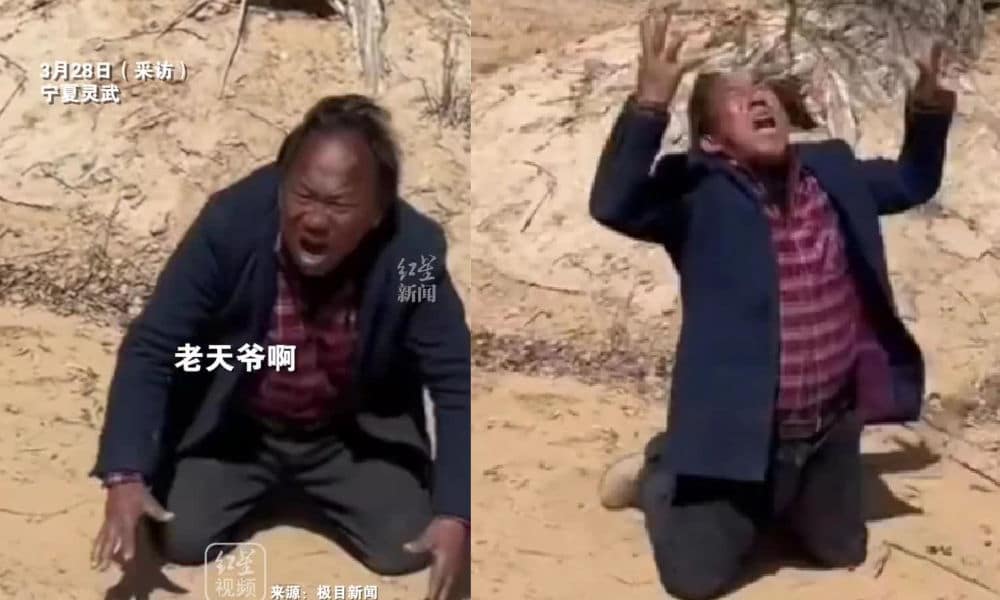
A video showing a Chinese land owner collapsing on the ground and begging for water has gone trending on Chinese social media.
The man in the video is Mr. Sun Guoyou (孙国友), a senior local resident who acquired a very large piece of dry, sandy land back in 2003 and has since been working hard to plant trees and grow plantations to enhance the soil conditions.
The land is located in Majiatan (马家滩镇), a small town with just over 5000 people in Lingwu, Ningxia, in the northwest of China.
Sun’s land covers about 3,294 acres (approximately 13 km2) in area, and about three quarter of the land has plantations and trees growing on it.
Earlier this year, a coal mine, located nearby Sun’s land, cut off the supplies of water to the area. This has devastating consequences since Sun depends on these water supplies for irrigation.
Without the water, Sun’s hard work of the past twenty years is going to waste and all of the plantations will die.
Although the coal mine previously promised Sun that they would restore the water supplies to his land, they have not done so yet. In an act of desperation, Sun threw himself to the ground and begged for water, shouting out: “They have not given me water, they did not give me water!”
That moment, which happened on March 27, was filmed by Sun’s daughter and then uploaded to social media, where it soon went viral on various social platforms including Douyin and Weibo, where different hashtags related to the incident received millions of views (some related hashtags received over 360 million views #市领导回应林场主跪地求供水#)

Different hashtags related to the incident became hot topics on Weibo. Screenshot by What’s on Weibo.
Since the video went viral, various Chinese media outlets have reached out to the 64-year-old Sun and his family. According to his daughter, who has grown up seeing her father planting trees and working on the sandy soils, this is the toughest situation the family has ever faced.
As reported by Sina News, the local water supply company is experiencing problems in providing water to Sun’s lands on time. The local mining activities have also impacted the quality of available water in the area; the water now has high salt concentrations and can not be used as irrigation water. The coal mine allegedly is the responsible party for not committing to their agreement and for disrupting the local water supplies.
Sina also reported that the state-owned mining & energy company Shenhua Group (中国神华), one of the largest coal-producing companies in the world, has been receiving many questions from investors following the incident. According to Shenhua, the mine in question is not related to them, and belongs to the China Energy Investment Group (国家能源集团), a mining and energy company administrated by the SASAC of China’s State Council.

The topic has partly received a lot of attention because it is not exactly clear who can be blamed for this situation and how to resolve it. It is just the coal mine that should take responsibility, what role is played by the local goverment, and what about the responsibilities of higher authorities?
Besides the legal discussions surrounding the topic, Sun has also touched the hearts of many netizens and is being called “a modern-day Yugong” (“当代愚公”).
Yugong refers to a well-known fable from Chinese mythology about “the Foolish Old Man who moved mountains.” The Chinese idiom (yúgōng yíshān 愚公移山) is about an old man whose family home in a remote village is blocked by mountains. To facilitate movement for himself and his (grand)children, the old man is determined to remove the mountains, shovel by shovel.
After years of hard work, the gods in heaven were so moved by the old man’s determination to move the mountain that they carried the mountain away. The story conveys the idea of strong faith being able to move mountains.
Determined to save his vast, sandy land – where he has manually planted trees over the past two decades, – Sun Guoyou is seen as someone who is also an image of perseverence and hard work.
For now, it seems that there is some light at the end of the tunnel for Sun and his family as the first local companies have arrived with huge water tank trucks to supply his land with water.
For this ‘modern-day Yugong,’ it may not be the gods in heaven but the helpers on social media that are trying to move mountains to save the hard-working man.
Update March 31: Modern-day Yugong or Greedy Wolf? Critical Discussions after Ningxia Land Owner Goes Viral Begging for Water
By Manya Koetse
Follow What’s on Weibo for more updates on this story. Subscribe to our newsletter by becoming a (free) member here.
Get the story behind the hashtag. Subscribe to What’s on Weibo here to receive our newsletter and get access to our latest articles:
Spotted a mistake or want to add something? Please let us know in comments below or email us. First-time commenters, please be patient – we will have to manually approve your comment before it appears.
©2023 Whatsonweibo. All rights reserved. Do not reproduce our content without permission – you can contact us at info@whatsonweibo.com.
Manya is the founder and editor-in-chief of What's on Weibo, offering independent analysis of social trends, online media, and digital culture in China for over a decade. Subscribe to gain access to content, including the Weibo Watch newsletter, which provides deeper insights into the China trends that matter. More about Manya at manyakoetse.com or follow on X.

China Animals
Behind the Mysterious Death of Chinese Internet Celebrity Cat Wukong
“Dont believe the media,” Zhao Shuo said: “And also don’t believe me.”
Published
1 month agoon
May 11, 2025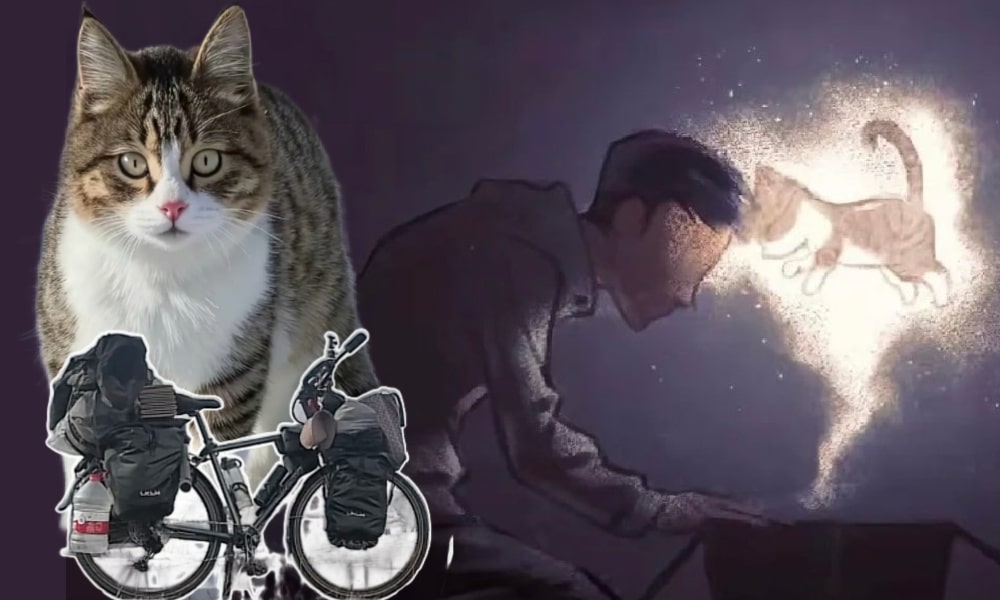
How did the death of a young stray cat lead to a online wave of grief and outrage over the past few days? It started with fans mourning a beloved Chinese internet celebrity cat, then turned into backlash against fake news, anger over animal cruelty groups, and suspicions that local officials were more concerned with controlling the narrative than finding the truth.
Although things turned dark quickly, it began beautifully light.
The journey of Chinese cyclist Zhao Shuo and his cat Wukong seemed to come straight out of a novel. Zhao Shuo, the protagonist: a solitary traveler who would cycle through snow-covered mountains and endless desert roads for days on end, seriously disciplined and focused.
Then came Wukong, the playful and spirited stray cat who suddenly appeared, curled up inside his tent, purring happily beside him as if they had always been together. She found just the warmth she needed – and so did he.
From Stray Cat to Star Status: Wukong and Zhao’s Journey
Zhao Shuo (赵朔) is a Chinese cyclist who runs a social media account about his adventurous travels, cycling and camping in China’s western regions. Since 2023 – starting in Xi’an — he has been documenting his remarkable journey on his Douyin account “Notes from Zhao Shuo’s Western Journey” (@赵朔西行漫记), which now has over three million followers.
In his videos — often long-form by Douyin standards (ranging from 12 to 40 minutes) — he offers viewers a glimpse into his ‘bikepacking’ life, cycling across West China, including Tibet, Xinjiang, and Qinghai, where he sometimes goes days without seeing another person, coming across lush green areas and dry, sandy territories while dealing with extreme temperatures.

Zhao Shu’s adventurous bicycle and wild camping travels, documented on Douyin. Screenshots via whatsonweibo.com.
Zhao had already published dozens of videos of his bicycle tour when he first introduced the kitten he named ‘Wukong’ (悟空) to his followers.
On October 30, 2024, while camping out in a village in Kanas (喀纳斯), near the main peak of the Altai Mountains (阿勒泰) in northern Xinjiang, the stray appeared in front of his tent at 4 am, waking him up with her cries. The kitten seemed cold and hungry. She had a small injury near her mouth and might have been a target in an area filled with stray dogs.
When he allowed her to step inside his tent, she soon comfortably settled inside his sleeping bag and purred away (video). In the morning, she stuck around the tent, Zhao fed her, and the two bonded.

Wukong on the night she ‘adopted’ her human master.
Of course, Zhao was smitten – and so were his followers – how could he possibly leave his ‘Wukong’ behind now? A suitable and creative nickname, ‘Wukong’ is the legendary Monkey King in the classic Chinese novel Journey to the West (西游记). Like the monkey’s 72 transformations, he hoped the cat would have 72 lives instead of just nine, and decided to take her along with him.
Wukong made Zhao’s travels a lot more lively, but also a bit trickier — he had to rearrange his cycling gear to accommodate her, including a special cat backpack and a basket out front, and now he was cooking for two.

A new travel companion.
But it was all worth it. Wukong, who Zhao endearingly called his “stinky cat” (臭喵), grew bigger, chubbier, and braver, and the two became inseparable. By late December, it was minus 20 degrees Celsius (−4°F) when the two visited the scenic Sayram Lake (赛里木湖), where they played in the snow — something they would do far more often later on in their journey.

Playing in the snow – a favorite pastime of Zhao and Wukong.

Snow adventures at the lake, by @奶盖味的小山竹.
So far, so cute – the story of the lonely traveler Zhao finding an unexpected companion in the little stray Wukong resembles that of the Scottish Dean Nicholson, who found a best friend in Nala while cycling through Bosnia and then taking her along cycling around the world. It even led to the book Nala’s World.

The story of Zhao and Nala shows some resemblance to that of Dean Nicholson and his cat Nala, about which he wrote the book Nala’s World. (Image via Traveling Cats).
Zhao kept Wukong close, but still gave her enough freedom to roam around. In the late afternoons or at night, she would play around the tent — or in the guesthouse room when temperatures dropped too low. She often hunted for mice and would proudly bring Zhao her catch. She always returned to him. In December, as they passed through areas with more cars and traffic, Zhao got Wukong a cat leash and a GPS collar for safety.
Chinese netizens and media quickly took notice as the special bond between the cyclist and his cat deepened — the two literally sticking together through snow and wind, sunshine and rain. In December 2024, they even made the news for unexpectedly boosting sales of a Xinjiang yogurt brand featured in many of Zhao Shuo and Wukong’s videos. Zhao’s travels, with Wukong the internet celebrity cat as his ‘mascot,’ seemed to bring positive attention to Xinjiang and its various regions.
“It’s Done”: Wukong Is Gone
The happy story of Zhao and Wukong abruptly ended on April 15. In a video posted to Douyin in the middle of the night, Zhao Shuo, his eyes glassy and his appearance stressed, explained that Wukong had a run-in with a car earlier that day and was now “eternally resting.”
Standing on the side of the road in Ruoqiang (若羌), with Wukong’s remains in a cardboard box, Zhao said he had just gotten a car from the Miran Site (米兰遗址) to try and find a freezer to store the remains of his cat friend, hoping some of his followers could help. The video received more than 116,000 replies.

The midnight call for help from Zhao in Ruoqiang.
However sad, Wukong’s death initially did not attract as much attention outside the Zhao and Wukong online fan circles. The case really began receiving widespread attention in the weeks that followed, as what first appeared to be a tragic accident started raising unsettling questions.
In early May, Zhao Shuo posted a 42-minute video (link to copy) recounting the various developments — from how Wukong died to everything that followed.
On April 15, Zhao Shuo and Wukong woke up at their campsite near the visitor center of the Miran Ruins (米兰遗址) — the remains of an ancient Silk Road settlement and Buddhist religious center located in Ruoqiang County.
Zhao had slept in that day until 3pm due to a rough, sleepless night the previous night. Zhao got out of his tent to go to the public toilet nearby, chatted with some visitors, and Wukong was following him as usual, staying near and playing around the square in front of the visitor center. Zhao put the GPS collar on her around 4 pm.
After 4 pm, Zhao briefly went into the main hall and took some photos. Wukong did not go in with him and remained at the front of the hall. Inside, Zhao inquired about the best route to continue his travels from Ruoqiang in Xinjiang toward Qinghai. He exited around 4:20 and visited the museum on the premises. It wasn’t until later in the afternoon, when he returned to his campsite, that he found Wukong was no longer there — not at their spot, not at the site.
By 6 pm, he went out looking for her. Thanks to the GPS system, he found — to his surprise — that Wukong’s location was over two kilometers away, and that there had been some disturbance in the signal.
He kept the camera rolling as he headed out on his bike to look for her, calling her name through an area of desert and empty highway. Then came the tragic moment Zhao spotted Wukong lying by the side of the road: “Oh god. I can’t believe my eyes, Wukong!” he said, the shock and pain visible on his face. The little cat was already lifeless and stiff. (Original video on Douyin removed; reuploaded video on YouTube: this is the moment Zhao finds Wukong)

Their heartbreaking final ride together.
“The stinky cat has been running around,” Zhao said, his voice breaking. “It’s done.” In a moving scene, he placed her in the basket on the front of his bike to take their final ride together and bring her back to the camp.
“Inexplicable Death, Full of Suspicious Points”: Zhao Searches for Answers
Back at the camp, Zhao walked around with Wukong’s stiff body in his arms, placing her on the ground and then picking her up again, seemingly overwhelmed with grief and unsure of what to do next.
Perhaps speaking more to himself than his viewers, he wondered how this could have happened — there was nothing but desert out there, with only a patch of green near his campsite. Wukong always stayed close, and there was nothing beyond to explore. How had she ended up so far from the site, all the way out by the national highway?
Once he collected himself, Zhao’s first priority was to cool Wukong’s remains. He packed up his belongings, arranged for a car, and made his way to Ruoqiang. There, he arranged storage for his bike and posted that video asking his followers if anyone could lend him a freezer. After that was taken care of, he spent the following days organizing a vehicle and a portable icebox. With Wukong stored in the back of the car, he returned to Miran to check the security footage — only to find that nothing had seemingly been recorded due to a malfunction.
The complete lack of surveillance footage was not the only peculiar detail surrounding the death of Zhao’s cat. To his surprise, he came across a news article from the well-known Chinese media outlet Jiupai News (九派新闻), reporting on Wukong’s death. The article had been published just hours after Zhao posted his first video announcing her passing and within 24 hours of her death.
In the report, published on April 16 at 14:04, reporter Huang Qiaowen (黄巧文) wrote that Wukong had died in a car accident, citing police as saying that the cat had crawled under a car and was accidentally run over when the driver started it. The article claimed the matter had already been resolved.
But according to Zhao, he had no idea how his cat had actually died — and had never come to any “understanding” with a car owner. “Which car owner? I don’t know anything,” he said. “This is considered a relatively big media outlet, it’s truly a blatant fabrication.”
Zhao added that he had spoken directly with the police, who told him they had no details about the incident beyond what he himself had reported, making the news story entirely false.
Zhao Shuo decided to set out again in a rental car on April 19, driving nearly 900 kilometers (560 miles) from Ruoqiang, via Korla, to Urumqi — the capital of Xinjiang. There, he visited three different pet hospitals to have Wukong examined, including both an X-ray and a CT scan.

The scans showed that Wukong’s organs and bones were intact.
In late April, Zhao returned to the Miran Ruins site twice, first to check whether the surveillance system had been fixed (it hadn’t), and later to see if any footage from the day Wukong disappeared had been recovered. Although the system was eventually repaired, there was still no footage from that day. Zhao also searched the surrounding area for any other surveillance cameras but found none that were relevant to where Wukong came from and where she was found.
“Traveling with a cat is full of risks, and I could accept it if Wukong had died in an accident,” Zhao said. “But this inexplicable death is full of suspicious points.”
🚩 One of the suspicious points is that Zhao found no obvious external injuries on Wukong — no bleeding from the nose or mouth. However, while her paw pads were intact, her claws were completely worn down, with split and damaged nails. Zhao initially considered the possibility that Wukong had climbed under a car parked near the visitor center and was unknowingly taken along when it drove off, eventually falling out onto the highway — which could explain the worn claws. However, the examination results showed that all major internal organs and bones were intact, with no signs of trauma, ruling out both a vehicle collision and a fall from height. Suffocation was also ruled out by the veterinarians.
🚩 Zhao also noted that the button on her GPS leash had come undone when he found her — something the cat would not have been able to do by herself.
🚩 The night when Zhao went to Ruoqiang in search of a freezer to store Wukong’s remains, he packed her in a plastic bag inside a cardboard box. Although there had initially been no visible bleeding, when he removed her body around 2 am, he found blood flowing from her mouth and nose in a non-coagulating state. This type of bleeding is consistent with toxin-induced bleeding, not trauma or natural death.
🚩 The conclusions from the different veterinarians were all consistent with symptoms of poisoning. The CT scan showed undigested food in Wukong’s stomach — notable because Zhao hadn’t fed her yet that day, as they had both slept in until later that afternoon. Zhao also inquired whether there was any rat poison in or around the visitor center and was told there was none.
🚩 The manufacturer of the GPS collar provided Zhao with the recorded data: the last refresh was at 4:10 pm, when Wukong was still near the visitor center, just after he had put the collar on her. The next location recorded was at 4:30 pm, right at the spot where Zhao later found Wukong’s body. This leaves a 20-minute gap in the data, which is highly abnormal, as the signal should refresh every 2–3 minutes under normal conditions.
Beyond the strange 20-minute interval, this also means that Wukong would have had to travel the full 2 kilometers from the Miran visitor center to the remote highway junction where she was found within those 20 minutes. But by the time Zhao discovered her around 6 pm, her body was already stiff and covered in flies, suggesting she had died well before that, making the timeline even harder to explain.

GPS collar data shows a 20 minute gap and the collar location going from the visitor center to side of the highway.
🚩 The area where Wukong was found sees hardly any traffic — it’s a quiet, almost abandoned stretch of highway. With all the information at hand, it’s just one more detail that makes her death all the more incomprehensible.
With all the new developments and information at hand, Wukong’s death not only triggered a wave of grief among fans, it also sparked broader concerns and anger over how she died.
These concerns soon touched upon the topic of so-called “cat abuse groups” — online dark web communities of twisted minds who take pleasure in abusing animals. These groups reportedly film or even livestream the capture and killing of stray cats. Some individuals even pay to watch such content. There is also a disturbing phenomenon of “bounties,” where money is used as bait to incite others to abuse or kill cats — sometimes specifically targeting well-known or popular strays to generate more buzz and attention.
The existence of these cat abuse groups became more widely known in April 2023, when Chinese food vlogger Xu Zhihui (徐志辉) was exposed as a member of a cat abuse chat group on QQ.
Various Douyin users have claimed that Wukong was, in fact, listed on one of these so-called “bounty lists.”
Whether or not Wukong’s death was actually connected to such abuse groups remains speculative — although many bloggers believe it is — most netizens engaged in these online discussions are convinced that, group or not, Wukong was deliberately poisoned by someone with malicious intent.
At the time of writing, several online animal advocacy groups are still urging the public to come forward with any dashcam footage or information they may have about what happened on April 15.
“Don’t Believe Me”: An Unnatural Apology
Amid all the online anger and speculation, a 3-minute video update by Zhao Shuo appeared on his channel on May 9.
In the Douyin video (link to reuploaded copy on Youtube), Zhao explained how he had rented another car to get back from Qinghai’s Mangya (茫崖市) to return to Ruoqiang County a final time to further investigate the cause of Wukong’s death.
The video was recorded at the exact spot where he found Wukong.

From the apology video.
Looking ahead while walking, Zhao says:
💬 “These days, I’ve been at the local Public Security Department, the Publicity Department and Cultural & Tourism department. With the warm assistance of local volunteers and citizens, through a step-by-step analysis and investigation, and step-by-step restoration of the scene, we basically determined the cause of Wukong’s death. That is the death caused by accidentally ingesting a [certain] small rodent. Other types of causes like car accidents, poisoning and torture have all been completely ruled out. So if we put it this way, the person who carries the biggest responsibility for the death of Wukong is me. As his owner, I didn’t look after him good enough. Wukong’s death has absolutely nothing to do with anyone else. Furthermore, this incident has caused a very negative public opinion for the local area. I hereby apologize to everyone, even though I know this apology is powerless, because the direction of public opinion is not something that can be changed by individual will.”
That part of the video was picked up by Chinese media. Beijing Daily even posted the apology on Douyin.
But they did not include what came next: a moment when something seems to shift in Zhao’s demeanor.

“Don’t believe me,” Zhao says.
After walking with the wind at his back, he suddenly turns around, now moving against it, looks straight into the camera, and says:
💬 “Additionally, I want to remind everyone of two points. First, never blindly trust anyone or any media outlet, especially immoral ones like Jiupai News. You even should not believe me. Everyone should rely on their own judgment. You need your own independent thinking to assess what a matter is about, how it developed – make your own reasoned judgement. Second, no matter how difficult or shocking the changes in life may be, we must respond with rational judgment, not blind emotional outbursts. Emotional release won’t solve anything — it will only make matters worse. Only by handling things rationally can we truly resolve problems.”
Zhao concluded the video by bidding his viewers farewell — something that was just as unusual as the short format of his video.
The next day, the video was suddenly deleted, along with a few other ones. Zhao’s Douyin account was also set to private.
On Chinese social media, from Douyin to Weibo, most commenters think they know why. “It’s because his apology wasn’t considered sincere enough,” one Douyin user suggested. Others also suggest that Zhao had been ordered to create an apology video.
📱 “(..) [It] clearly sounded like someone higher up told him to say them — way too official/formal.”
📱 “Classic, truly classic — absolutely classic!!! (..) They only talk about the impact of public opinion, but not about what triggered it. And they even hide the truth! So classic!”
📱 “I’m bursting with rage, they’re deleting the Douyin videos. So they claim it’s because [Wukong] mistakenly ate a small rodent, and that’s why it unbuckled its own harness, the signal was blocked, and [the cat] walked two kilometers in a straight line by itself? Wow. I honestly don’t even know what to say anymore.”
📱 “Wukong would never eat a dead rat — at most, he’d eat small field mice. I’m really furious. I can’t say too much, I don’t want to cause trouble for [Zhao Suo], but I will remember this place: Ruoqiang County.”
📱 “It probably ate a bat, and after eating it, it could fly and flew straight for two kilometers… even managed to undo the clasp behind its neck… in the end, it clawed at the ground until its paws were torn apart, then collapsed and couldn’t get up...”
📱 “I think that if Wukong’s cause of death is really as the Ruoqiang authorities claim, then they should release pictures of this rodent species. This rodent is definitely poisonous — the evidence being that Zhao Shuo took Wukong to more than two hospitals, and tests confirmed the presence of toxins. After all, that area is visited by many tourists, so it’s important to inform them to stay away from this rodent.”
📱 “Doesn’t anyone want to know the truth? Doesn’t anyone feel very bad for these two? One died in an unclear and unjust way.The other suffered while seeking the truth, and was crushed by an invisible force, like a mountain pressing down. This is truly criminalizing the innocent. Most netizens only see what’s presented on the surface, and blindly believe it.(..) Hope this incident can push for improvements in the Animal Protection Law.”
Was Wukong truly the victim of an animal abuse group? Was the cat purposely killed by a local? Or, as some suggest, did she eat rat poison near the visitor center and was disposed of near the highway by people who did not want any trouble? Or is there a far more innocuous reason for the cat’s death, like digesting a poisonous rodent and running 2km before dying?
Regardless, the entire incident does little to enhance the image of Xinjiang’s Ruoqiang region, and this very likely played a role in the eventual ‘apology’ video posted — and then deleted — by Zhao.
There are many sides to this story, and you can dive deeper depending on what you choose to highlight. There’s the simple fact that Chinese digital media outlets like Jiupai News apparently fabricate stories for reasons one can only guess; there’s the angle that draws attention to how animal abuse is used as a form of entertainment in niche online circles; and there’s the undeniable reality that Chinese influencers have the power to make and break the public image of certain places in China — a fact that is readily embraced by local authorities when it casts them in a positive light, and sometimes quietly erased when it doesn’t.
But, above all, this is still a story about the friendship between a man and his cat. The way it ended only underscores just how deep that bond truly was.
After visiting Urumqi to have Wukong examined, Zhao drove another 600 kilometers (about 370 miles) — making it a total of 1,500 kilometers (around 930 miles) from Ruoqiang (and another 1,500 kilometers to return to his bicycle) — to reach Kanas and the majestic Altai Mountains, where he first met the kitten Wukong in 2024.

Wukong buried in the snowy mountains she loved – and where they first met.
It is here where Zhao wanted to say a final goodbye to his “stinky cat.” He dug a grave and laid Wukong to rest.
Meanwhile, on Chinese social media platforms like Weibo, Xiaohongshu, and Douyin, people are honoring Wukong — and venting their anger — in their own ways. These are some of the online tributes:

Wukong the cat, with reference to “Journey to the West,” saying: “Humans, do your best.” Posted by Douyin user: 大哥性感

Posted by Weibo user @杨于钥杨羊.

Zhao kneeling besides the box, with Wukong rising from it, shared by @余煌化妆师.

Dark hands reaching for the celebrity cat – original creator unknown.

The “Monkey King” cat is drying the tears of Zhao, at the camp site. Shared by @温婉的牛马, @赤火飞.

Wukong left at Altai Mountain, Zhao Su walks away. AI image via Xiaohongshu, original creator unknown.
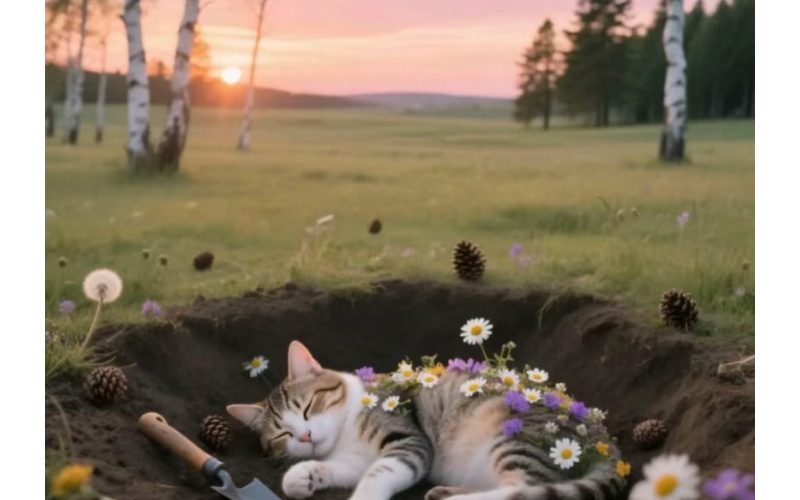
Wukong in the grave, shared by @余煌化妆师.

Paw prints left on Zhao’s heart, memories of happy snow days.

More examples of online tributes to Wukong.
There are also artists who draw Wukong, sometimes on paper (see here), but also on walls (see videos here and here).
In a way, these images have now become a form of resistance in the face of uncertainty, and Wukong has come to represent something bigger.
One Weibo user wrote:
📱 “I’ve been continuously following this case. Based on the latest updates from the ‘master’ [an online nickname for Zhao Shuo], it really feels like he’s been threatened and can no longer continue searching for clues. In the end, it’s the power of capital and background connections that’s suppressing us ordinary people.(..) Supporting the legislation of an Animal Protection Law is more urgent than ever — it starts with you and me. Speak up for Wukong, and for the countless stray animals out there!”
Although there are various laws in China regarding wildlife and the protection of animals, there currently is no national law that is explicitly against animal cruelty for all animals. In recent years, voices calling for better laws on animal abuse in China have grown louder.
As for Zhao Shuo, he is continuing his journey — leaving Xinjiang for Qinghai. In his latest video, he said he won’t talk about Wukong anymore. Beyond any external pressures he faces, it will take time for him to process the loss of his travel companion, whose legacy endures not only in his heart but also within a much wider online community.
“Thank you for bringing joy into my otherwise ordinary days,” one Weibo user wrote. “Goodnight, little Wukong, and don’t forget — we’ll miss you very much, you stinky cat. I think I’ll remember this story for a long time — we’ll often look back at the footprints you left behind.”🐾🔚
By Manya Koetse
(follow on X, LinkedIn, or Instagram)
Spotted a mistake or want to add something? Please let us know in comments below or email us. First-time commenters, please be patient – we will have to manually approve your comment before it appears.
©2025 Whatsonweibo. All rights reserved. Do not reproduce our content without permission – you can contact us at info@whatsonweibo.com.
China Animals
Outrage over Chinese Food Blogger Torturing Cat in Online Video
Chinese food vlogger Xu Zhihui (徐志辉) was part of a cat abuse chat group on QQ.
Published
2 years agoon
April 28, 2023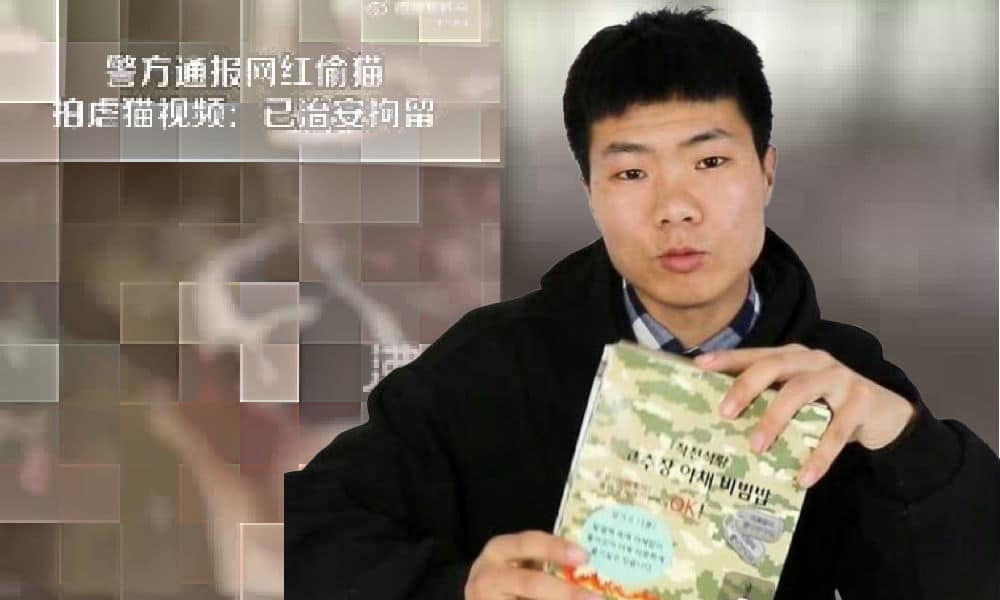
A shocking and extremely cruel video in which a Chinese wanghong (online influencer) tortures a stolen cat has sparked outrage on Chinese social media.
The person involved is the Anhui-based food blogger/vlogger Xu Zhihui (徐志辉), who runs multiple accounts, including a Bilibili account with more than 400,000 followers and a Weibo account with over 20,000 fans (@杰克辣条). Xu is mostly known for posting videos of himself cooking and eating food.

The cat abuse incident happened on April 15 in Funan County’s Lucheng, Anhui Province, where the 29-year-old Xu filmed his horrific acts, including tying up the cat, binding it to a tree, cutting its paws, and burning it alive. He then uploaded the video and shared it to a QQ group dedicated to cat abuse. It later circulated around social media, triggering outrage.

According to screenshots that leaked online and the very fact Xu was part of a cruel ‘cat abuse chat group,’ this probably was not the first time for him to torture animals.
According to a police statement, authorities received reports about the stolen cat and the abuse video on April 26th, after which they immediately launched an investigation.
On April 27th, Xu posted an apology on his Weibo channel, in which he said he felt ashamed and sorry for what he did and that he was willing to bear “all the consequences” of his actions. He also wrote that he was being criticized and held accountable by both the public security bureau and Internet authorities. “Please give me another chance,” he wrote. The comments on the post were switched off.
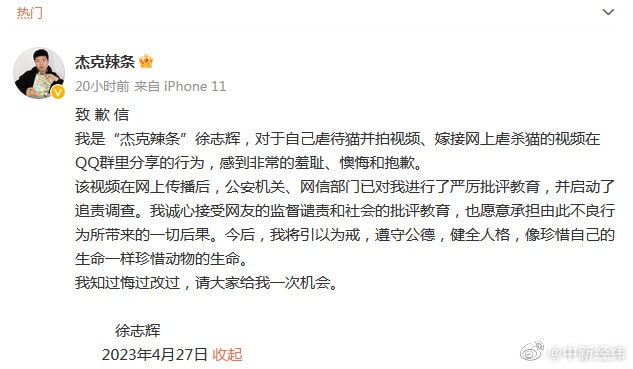
A noteworthy part of Xu’s online apology is that it has a dedicated Weibo hashtag page including a ‘topic summary’ in which Xu apologized. The hashtag page was hosted by Toutiao News. The mix of the personal message by Xu on a hashtag page hosted by Chinese media seems to indicate that these parties worked together in spreading Xu’s words about how remorseful he allegedly is (#偷猫拍虐猫视频网红道歉#).
The comment sections suggest that most people will not forgive Xu for what he did. Many people say the story makes them feel sick to their stomach, and that the idea of ‘cat abuse’ chat groups makes their skin crawl.
“People like this do not change,” one person wrote. “Give you another chance?! Did you give that kitty a chance?!”
“Today he abuses a cat, tomorrow he kills a person. Straight to hell with him,” others wrote: “Go die!”
Xu’s actions are regarded as “negatively impacting society” and he currently is detained in Funan in accordance with the Public Security Administrative Punishments Law. His Bilibili account currently also displays a message that it is getting banned.
Although there are various laws in China regarding wildlife and the protection of animals, there currently is no national law that is explicitly against animal cruelty for all animals. Some legal bloggers explored under which laws Xu could be punished for his actions other than the abuse itself, such as stealing a cat and also uploading such a video to the internet (#虐待无主流浪猫狗或不被处罚#, #公共场合虐待动物并传播视频或犯罪#).
In recent years, voices calling for better laws on animal abuse in China have grown louder. In 2020, after a horrific story of a Chinese security guard pouring scalding water over a cat went viral, Chinese media outlet CCTV called out for a rapid legislation against animal abuse. That same video was shared in light of this incident again.
In 2021, home security cameras captured how anti-epidemic workers beat a pet dog to death in Shangrao. This also caused an online storm over animal abuse during ‘zero Covid.’
“I strongly call for legislation, [we must] defend the bottom line of morality,” some commenters now write: “We will never forgive this.”
By Manya Koetse
Get the story behind the hashtag. Subscribe to What’s on Weibo here to receive our newsletter and get access to our latest articles:
Spotted a mistake or want to add something? Please let us know in comments below or email us. First-time commenters, please be patient – we will have to manually approve your comment before it appears.
©2023 Whatsonweibo. All rights reserved. Do not reproduce our content without permission – you can contact us at info@whatsonweibo.com.
Subscribe

Inside the Labubu Craze and the Globalization of Chinese Designer Toys

Lured with “Free Trip”: 8 Taiwanese Tourists Trafficked to Myanmar Scam Centers

10 Viral Chinese Phrases You Didn’t Know Came From Video Games

Earring Gate: Huang Yangdiantian and the 2.3 Million RMB Emerald Earrings

Guming’s 1 Yuan Ice Water: China’s Coolest Summer Trend

China Is Not Censoring Its Social Media to Please the West

IShowSpeed in China: Streaming China’s Stories Well

China Reacts: 3 Trending Hashtags Shaping the Tariff War Narrative

US-Russia Rapprochement and “Saint Zelensky”: Chinese Online Reactions to Trump’s Shake-Up

Chinese New Nickname for Trump Mixes Fairy Tales with Tariff War

Squat or Sit? China’s Great Toilet Debate and the Problem of Footprints on the Seat

China Trending Week 15/16: Gu Ming Viral Collab, Maozi & Meigui Fallout, Datong Post-Engagement Rape Case

Strange Encounter During IShowSpeed’s Chengdu Livestream

No Quiet Qingming: From High-Tech Tomb-Sweeping to IShowSpeed & the Seven China Streams

Inside the Labubu Craze and the Globalization of Chinese Designer Toys
Get in touch
Would you like to become a contributor, or do you have any tips or suggestions? Get in touch here!
Popular Reads
-

 China Media11 months ago
China Media11 months agoA Triumph for “Comrade Trump”: Chinese Social Media Reactions to Trump Rally Shooting
-

 China Society9 months ago
China Society9 months agoDeath of Chinese Female Motorcycle Influencer ‘Shigao ProMax’ Sparks Debate on Risky Rides for Online Attention
-

 China Memes & Viral11 months ago
China Memes & Viral11 months agoThe “City bu City” (City不City) Meme Takes Chinese Internet by Storm
-

 China Society12 months ago
China Society12 months agoHero or Zero? China’s Controversial Math Genius Jiang Ping




